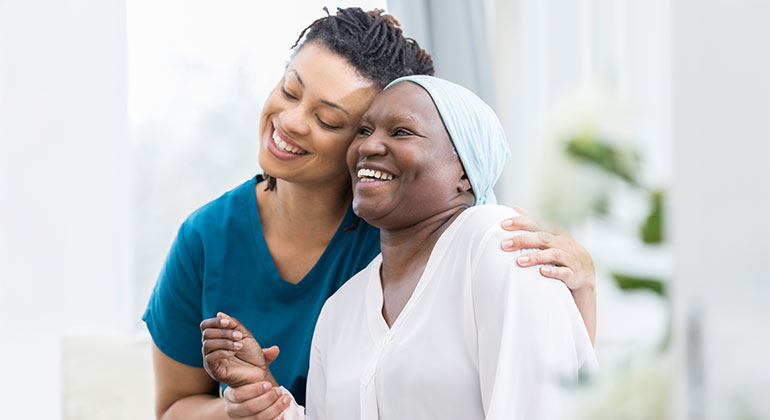Tools and Trainings for Community Health Care Workers

Community Health Workers (CHWs) play a vital role in helping older adults with HIV navigate their care. There are six major areas that we think about when we work with this group: mobility, mind, medications, multi-complexity, modifiable issues, and (what) matters most. We call these the 6Ms.
Training Procedures
All members of the team should be fully informed about HIV and older adult care. The model assumes that the geriatrician and social worker are fluent enough in the topics to provide ongoing training for the CHW.
Electronic Medical Record System, Health System, and Safety
The team will provide clinical operations training on these topics as part of the onboarding process. The team will revisit these topics as the CHW begins working with the team.
Patient Health Screenings
The nurse will train the CHW to perform this screening, following these steps:
- The nurse will introduce the CHW to the elements of the screening.
- The CHW will watch the nurse administer the assessment.
- The CHW will discuss any questions with the nurse.
- The CHW will administer the screening with nurse supervision in the room.
- The CHW will administer the screening and will check-in weekly during supervision meetings with the geriatrician and social worker.
Assessments
The geriatrician will train the CHW to administer the following assessments, using the same approach as with the Patient Health Questionnaire 4 screening:
- General Anxiety Disorder 7
- Activities of Daily Living
- Instrumental Activities of Daily Living
- FRAIL Scale
Team Meetings
Communication is key to effective health care and education. We recommend holding the following types of meetings regularly:
- Team Meeting: The goal is to ensure program is running smoothly, especially to support CHW integration as well as referral pathways, community resources, and evaluation plans.
- Frequency: Monthly
- Participants: All team members including CHW, patient liaison, and the evaluation staff
- Structure: Geriatrician leads the meeting following the proposed agenda
- CHW Supervision: The CHW should have two supervision meetings weekly, one with the geriatrician and one with the social worker. The goal is to review cases, answer questions, troubleshoot and support CHW in providing navigation support to patients.
- Structure: The geriatrician and social worker will lead following the sample agenda
- Institute for Advanced Medicine Provider and Consumer Meetings: The goal of this meeting is to expand the referral pool and support CHW relationship building. We recommend the following:
- Frequency: Every three months
- Participants: CHW, HIV-geriatric team leads, program manager, and members of standing groups
- Structure: 15-20 minute presentations aimed at providers and patients, and incorporation of feedback to refine the approach
- Leadership Meetings: The purpose of these sessions is to continue to support the CHW and incorporate the CHW into the geriatrics HIV team.
- Frequency: Every two months
- Participants: Program director, development director, program leads
- Structure: Agenda-guided meeting. The meeting should address any programmatic updates, ongoing quality improvement efforts, and sustainability.
Additional Resources:
- Comprehensive Care for Older Adults with HIV Program Overview
- CHW Pre-Visit Phone Calls
- During the Geriatrics HIV Visit
- CHW Post-Visit Service Coordination
- Hierarchical IDT Task Diagram
For more information, email our team at AgingwithHIV@mssm.edu.